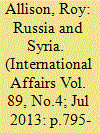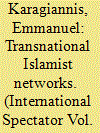| Srl | Item |
| 1 |
ID:
123980


|
|
|
|
|
| Publication |
2013.
|
| Summary/Abstract |
This article explores explanations of Russia's unyielding alignment with the Syrian regime of Bashar al-Assad since the Syrian crisis erupted in the spring of 2011.
Russia has provided a diplomatic shield for Damascus in the UN Security Council and has continued to supply it with modern arms. Putin's resistance to any scenario of western-led intervention in Syria, on the model of the Libya campaign, in itself does not explain Russian policy. For this we need to analyse underlying Russian motives. The article argues that identity or solidarity between the Soviet Union/Russia and Syria has exerted little real influence, besides leaving some strategic nostalgia among Russian security policy-makers. Russian material interests in Syria are also overstated, although Russia still hopes to entrench itself in the regional politics of the Middle East.
Of more significance is the potential impact of the Syria crisis on the domestic political order of the Russian state. First, the nexus between regional spillover from Syria, Islamist networks and insurgency in the North Caucasus is a cause of concern-although the risk of 'blowback' to Russia is exaggerated. Second, Moscow rejects calls for the departure of Assad as another case of the western community imposing standards of political legitimacy on a 'sovereign state' to enforce regime change, with future implications for Russia or other authoritarian members of the Commonwealth of Independent States.
Russia may try to enshrine its influence in the Middle East through a peace process for Syria, but if Syria descends further into chaos western states may be able to achieve no more in practice than emergency coordination with Russia.
|
|
|
|
|
|
|
|
|
|
|
|
|
|
|
|
| 2 |
ID:
125904


|
|
|
|
|
| Publication |
2013.
|
| Summary/Abstract |
Western Muslims have joined jihadi groups in Afghanistan/Pakistan, Somalia and Syria to defend Islam from its perceived enemies. Transnational Islamist networks have played a pivotal role in bringing them to conflict zones by fulfilling three functions: radicalisation through mosques, radical preachers, and the Internet; recruitment which can be conducted either physically or digitally; and identity formation that provides the radicalised recruits with a larger cause to fight for as members of an imagined global community. Transnational Islamist networks are multifunctional entities on the rise.
|
|
|
|
|
|
|
|
|
|
|
|
|
|
|
|